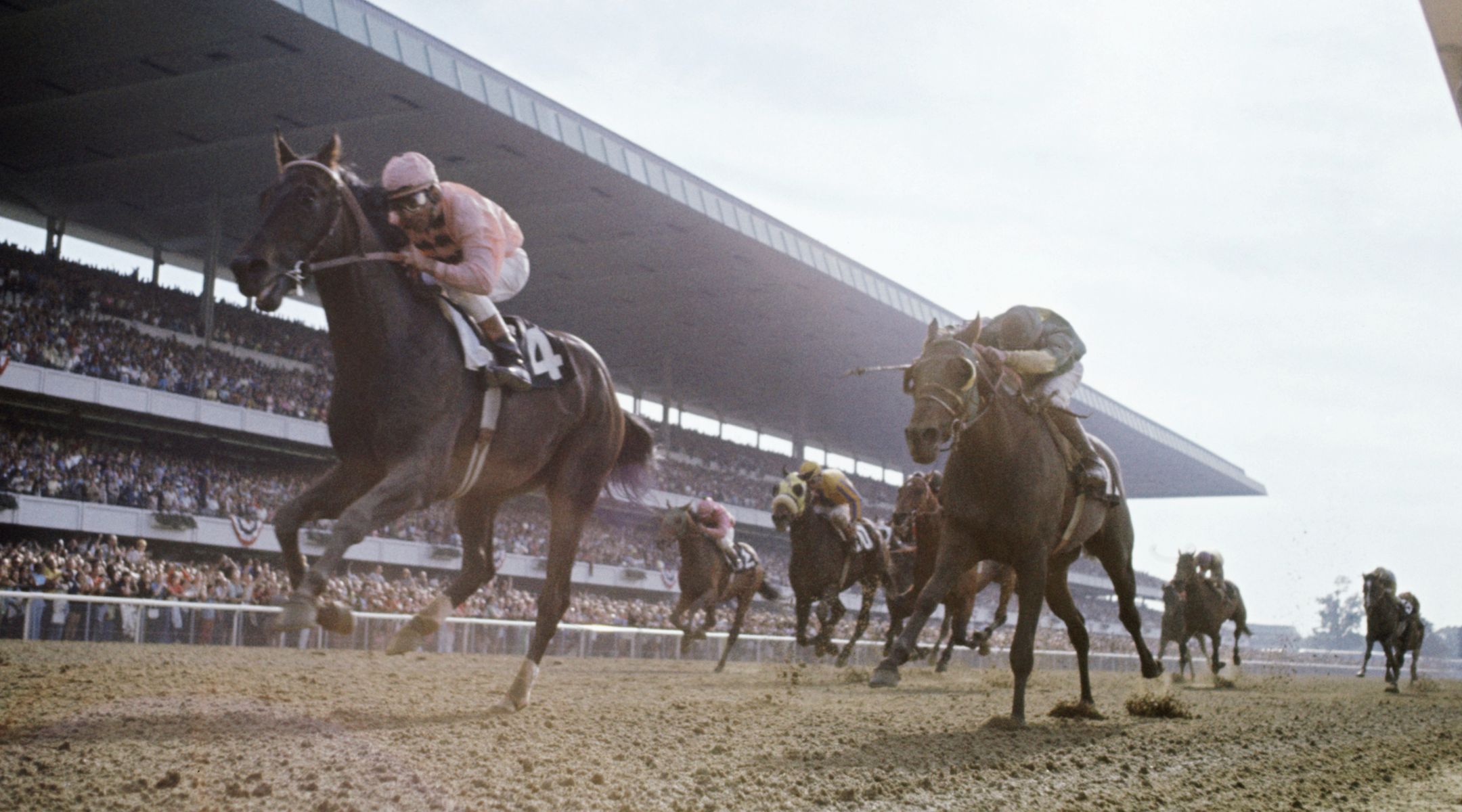Jewish Hall-of-Fame jockey Walter Blum, who rode to victory in Belmont Stakes, dies at 89
Blum won more than 4,000 races in a 22-year career, but his most famous ride was the 1971 Belmont Stakes, when he rode 34-1 long shot Pass Catcher to an upset victory

Jockey Walter Blum, left, and his horse, Pass Catcher, in the lead at the 1971 Belmont Stakes. (Getty)
(JTA) — Jockey Walter Blum, the only Jewish rider inducted into the National Museum of Racing and Hall of Fame, died Thursday. He was 89.
The cause was lung cancer, according to Blum’s longtime friend and fellow jockey, Tony Black.
Blum, the Brooklyn-born son of a newspaper delivery man, won more than 4,000 races in a 22-year career, mostly on tracks in New York, New Jersey and Florida. Those included victories in some of the best-known races, including the Whitney, the Woodward, the Metropolitan, the Mother Goose, the Santa Anita Derby and the United Nations.
His most famous ride was the 1971 Belmont Stakes at Belmont Park, New York, when he rode 34-1 long shot Pass Catcher to an upset victory, denying Canonero the fabled Triple Crown. Blum became the first — and so far only — Jewish jockey to win the third leg of the Triple Crown.
Though no Jewish jockey appears to have won the Kentucky Derby, Blum holds the distinction of the highest finish by a Jewish jockey in thoroughbred racing’s best-known race, finishing fourth aboard Reason to Hail at Churchill Downs in 1967.
Blum rode one other time in the Kentucky Derby, in 1973, where he finished eighth on Royal and Regal. That race was better known for the ride Ron Turcotte had on the all-time great Secretariat — en route to a Triple Crown.
Black, who competed against Blum at the now-defunct Garden State Park and Atlantic City Race Track in the 1970s on the New Jersey racing circuit, told the Jewish Telegraphic Agency that he spoke with Blum on Wednesday afternoon, and reminisced about Blum’s historic ride at at the Belmont.
“I was kidding with him yesterday,” said Black. “I said, ‘Did you ever get that stick back?’” Blum had dropped his whip halfway through the race.
“He laughed, he said, ‘You always remember I dropped my stick, but I won that race anyway. I just wanted to show the New York riders I didn’t need a stick to beat them.’”
Blum had ridden Pass Catcher just five days prior to the Belmont Stakes, finishing second in the Jersey Derby at Garden State Park — an improbably short turnaround for a horse in a major thoroughbred race.
Black watched Blum win the Belmont from the jockey’s room at Garden State Park, and he said all the riders there cheered Blum on. “When a rider would ship [to New York tracks] for a major race some place and they came out of our jocks room, the Jersey jocks room, you certainly wanted to go watch him ride,” said Black.
Black added that Blum was in good spirits just hours before he passed away, reminiscing about their days at the Garden State Park.
Blum was inducted into the International Jewish Sports Hall of Fame in 1986 and the National Museum of Racing and Hall of Fame in Saratoga Springs, New York in 1987.
David Cohen, the most recent Jewish jockey to ride in the Derby (finishing seventh aboard Keepmeinmind in 2021), told JTA that Blum “leaves the racing world with such an impact, especially for Jewish athletes and jockeys. Walter achieved such amazing things as a jockey, especially being blind in one eye” from having fallen off a toy horse as a child.
Cohen added, “It’s hard to even imagine how truly talented he was. Walter will always be a legend.”
Cohen, who attended several annual gatherings of retired Jewish jockeys in California when he was just starting out in the business, said, “I knew all about him and every other Jewish jockey legend. It was such an honor to meet them all when I was a bug boy at Del Mar.”
Black described Blum as a “put-him-on-the-lead speed rider, but he could ride any kind of horse — if they came from off the pace he could also ride ‘em.”
According to the Encyclopaedia Judaica, Blum, nicknamed “Mousy,” shined shoes to pay for trips to New York-area horse stables and dropped out of high school at 16 to work as a horse walker for trainer Hirsch Jacobs, another Jewish Hall of Famer who grew up on the sidewalks of New York. “I fell in love with the horses, the people, and even just the smell of the place,” Blum wrote in a letter to a horse racing blog in 2022.
He won his first race in 1953 at Saratoga Race Course in Saratoga, Springs, New York. He retired from riding in 1975 and stayed connected to the sport as a steward at Garden State Park, until a fire destroyed the track in 1977. He later lived in Hallandale, Florida.
In the same 2022 letter, Blum said he had become disillusioned with the current state of the racing industry, which had been marred by a series of doping scandals.
“Nothing wrong with helping a horse get over an ailment with legal medication, however if you’re going to use an illegal medication to enhance the horse’s performance, think of your wife, your kids, your family and yourself, your name and reputation smeared and ruined,” he wrote.
“Don’t let this happen, let racing continue as the Sport of Kings. Then we can hold our heads high.”
Blum is survived by his son Walter Blum Jr. and his partner Iris Zakoor.
This article originally appeared on JTA.org.
















